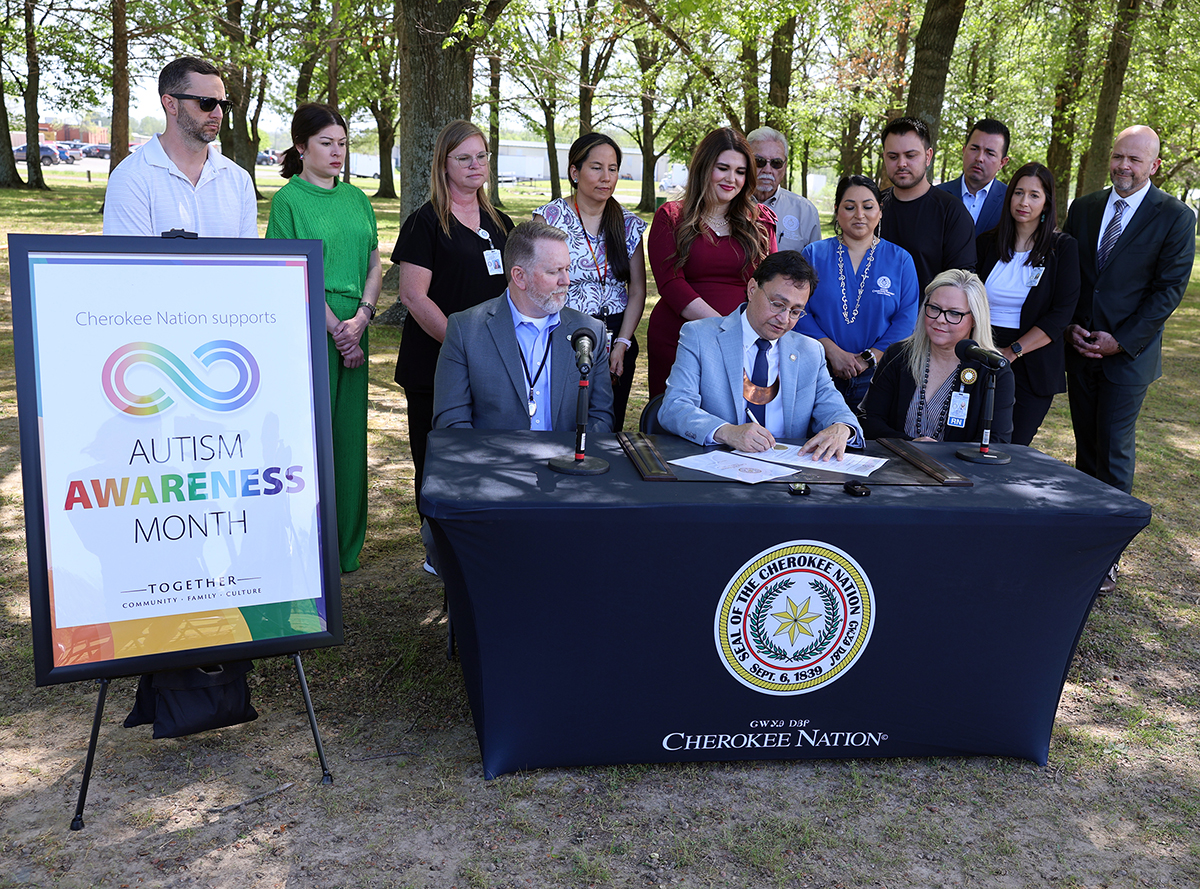TAHLEQUAH, Okla. — The Cherokee Nation Autism Task Force issued a report recently that revealed its findings and recommendations to better address autism diagnosis and treatment for Cherokee Nation citizens since the creation of the task force in April 2023.
“Shining a light on the issue of autism and the care and treatment for autism has become increasingly important to the Cherokee Nation and of increased focus in our health system,” said Principal Chief Chuck Hoskin Jr. “This encourages me because I’m on a journey of learning, as I have beautiful grandchildren with autism, and many people in the Cherokee Nation are on that same journey. What we ought to do for everyone is to understand the world from their perspective and understand how they see things and interact with their environment.”
The task force issued its report during a ceremony April 17, where Chief Hoskin also signed a proclamation declaring April as Autism Awareness Month in the Cherokee Nation.
“We’ve been encouraged to do more for those with autism, their caregivers, and to declare April as Autism Awareness Month,” Chief Hoskin said. “This has led to real substantive work on the issue of autism within the Cherokee Nation. The task force report contains a great deal of substance and signing the proclamation this year was particularly special because of the efforts of the task force.”
Over the last year, the task force has focused on analyzing the services and resources currently available throughout the reservation.
“Autism impacts each person in different ways and results in unique strengths and challenges. We are committed to enhancing our health care system to provide these critical screenings, diagnosis, treatment and intervention services that can be tailored to Cherokee citizens who have been diagnosed with Autism Spectrum Disorder,” said Deputy Chief Bryan Warner.
The task force is also working to identify gaps, and developing goals and operational activities.
“I’m thankful for the opportunity to participate in this important task force and for the overwhelming support that we have received throughout this process,” said Dr. Rebecca Shepherd, senior director of nursing for Cherokee Nation Health Services and chair of the autism task force. “I know that I speak on behalf of all members of the task force when I say that we are thankful for the vision of our administration, honored to be involved, and have all been inspired and positively impacted by this experience.”
Community engagement and information sharing were central components of the analysis. The task force hosted town hall meetings, which were both in-person and online to increase accessibility, where task force members could meet directly with communities and have valuable open dialogue with Cherokee self-advocates and caregivers.
During the time of evaluation, the task force worked to address immediate needs within the health system. Collaboration between Cherokee Nation and Pervasive Parenting for adolescent social and caregiver support was also initiated to bring awareness and maximize resources to Cherokee citizens.
Housing and lifespan considerations, workforce development and educational support were among the key themes identified at the town hall meetings and were crucial in shaping the recommendations from the task force.
A complete list of the recommendations is detailed in the full Cherokee Nation Autism Task Force report available online at https://www.cherokee.org/our-government/autism-task-force/.
“I want to thank Cherokee Nation administration for their support and for challenging us to be more inclusive,” Cherokee Nation Health Services Executive Director Dr. R. Stephen Jones said. “This is an opportunity to educate our staff and to increase access to care to a population that often gets left behind.”
Autism Spectrum Disorder is a developmental disability that can affect anyone regardless of age, race, gender or socioeconomic background. In 2023, the Centers for Disease Control and Prevention estimated that approximately 1 in 36 children in the U.S. have been diagnosed with an autism spectrum disorder.

